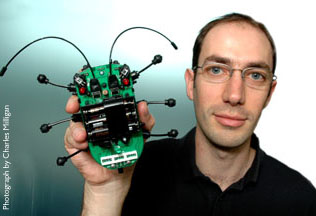Peterís Thoughts
I've been called many things over the years. I've been called a maverick scientist by several researchers. Or a wildly creative computer scientist. Or the Undercover Scientist. Or that guy who made the iStethoscope App. Or an annoying nuisance.
You could say that I began my research career as a child, building robots and programming computers from the age of nine. I was always trying to mimic natural processes, whether it was an autonomous robot that detected obstacles or a program that modelled evolution or the growth of plants. Before long I was studying computing and electronics seriously at school, and then Computer Science and Artificial Intelligence at University. The progression to PhD on the topic of evolutionary design seemed almost inevitable. And so began my research career into computation and biology.
Since those early years I've learned just how little I know. I've delved into evolution, development, immune systems, swarming systems, neural networks and other natural emergent processes. I've worked with scientists from a large number of disciplines, but also with artists, musicians, medical doctors and designers. I've also learned how to write popular science books and communicate to the public via science writing in magazines, or broadcasting on radio and television. The result is two strong beliefs:
- I think scientists, whatever they do and whoever they are, need to recognise and control the impact of their work. They must understand that society may be changed by their work, and they should set their goals to meet the needs and constraints of society. They must also learn to communicate their ideas effectively to many different audiences, but they must not let their science be corrupted or watered down by the demands and rewards from the media, funders or politicians.
- The complexity we see in natural systems can be attributed to emergent behaviour resulting from the interactions of simpler elements. We can analyse and exploit such complexity if we understand the information flow and organisation of the systems. To put it another way - I'm a computer scientist and perhaps predictably, I think most things in the universe can be understood in terms of computation.
These beliefs have emerged over the years as my dual career of research and public dissemination. They have led me to take a highly unconventional career path, funding my scientific research through the public dissemination work.
Today my scientific influences come from areas such as biology and medicine (a rich source of amazing problems and opportunities), embodiment (interactions between systems and environments), exploitation (dropping processes into media with sufficient richness to enable intrinsic properties to be harnessed), and systemics (circular causation, where influence between two systems may be both cause and effect), scalability (through the use of new hardware techniques such as parallel computing and new software methods), and representation (where and how should information be stored and used). I like to produce adaptive technologies that solve real problems in amazing new ways. It's a great time to be in this field, as revolutionary new ideas in machine learning are emerging constantly. Am I excited? Sure am.
